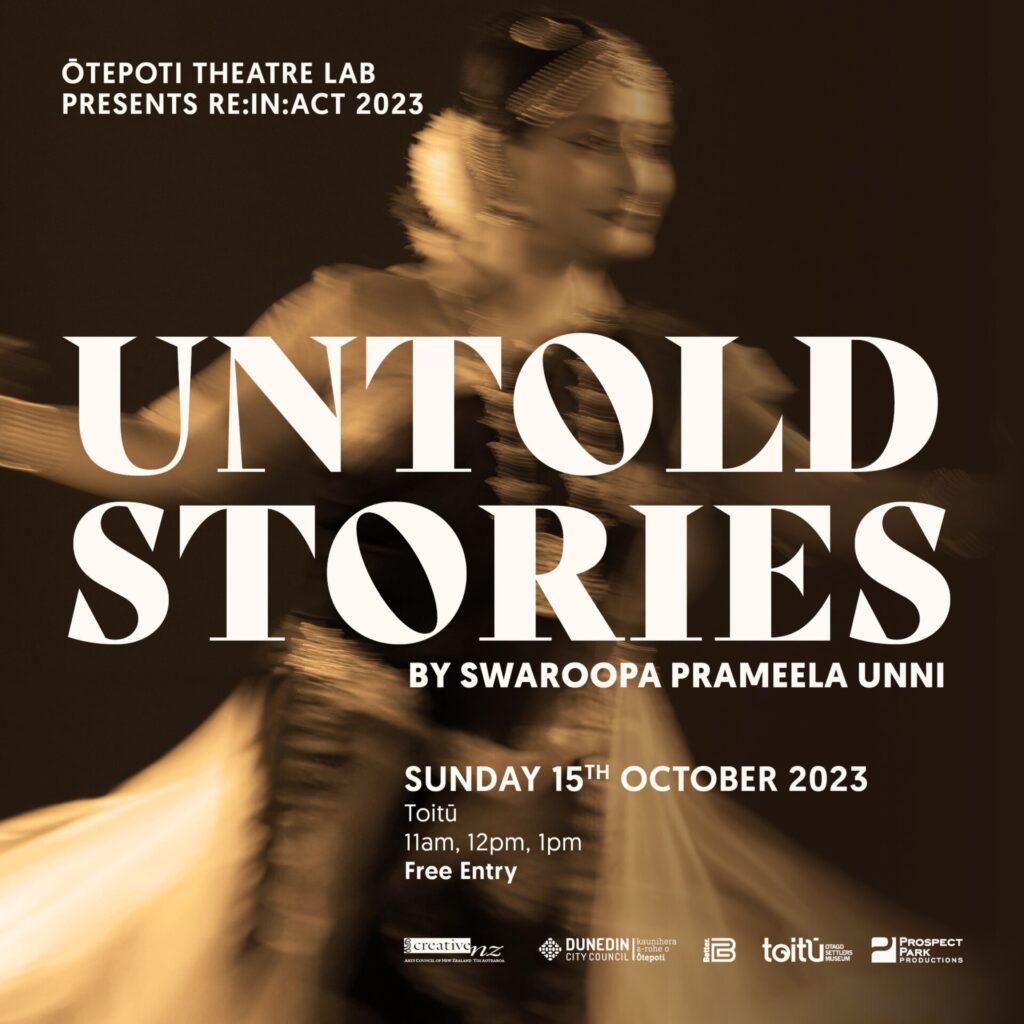Untold Stories
Toitū Otago Settlers Museum, 31 Queens Garden, Dunedin
15/10/2023 - 15/10/2023
Production Details
Created by Swaroopa Prameela Unni
Ōtepoti Theatre Lab.
2023 series of Re:In:Act – Ōtepoti’s stories brought alive in performance by top local artists and proudly presented by Ōtepoti Theatre Lab.
Presenting Untold Stories, created by Swaroopa Prameela Unni: a dance movement sequence inspired by the journeys of lascars, and introducing our audience to the invisible history of Indians here in Ōtepoti.
Three performances only, Sunday 15th October 2023
11am, 12pm, 1pm (approx. 10-15 minutes duration)
FREE, no booking required
Dance ,
30 mins
Audiences leave with much to think and talk about
Review by Hannah Molloy 16th Oct 2023
I think I often see Swaroopa Unni perform when there’s some kind of political disquiet and I always find a connection in her work to that disquiet, and a sense of solidarity and activism – there’s a gentleness to Swaroopa’s choreography that is underpinned by militant desire for equity and recognition of her people and their contribution, in this case to the colonial settlement period of Aotearoa’s history.
Untold Stories is a revelation, again, of colonial whitewashing that I (a Pākehā woman) hadn’t even considered. Swaroopa tells the story of the first Indian people to arrive on the shores of Aotearoa – two Lascars aged 14 and 16, in 1769 at the Port of Hokianga – followed a few years later by another four people. As I watch Swaroopa tell their story through her body and her expression, I wonder how lonely they had been, and cold.
The next part of our history lesson is about Edward Peters, an Indian man who worked as a shepherd and, it turns out, was the first to discover gold in Gabriel’s Gully – not called Peters’ Gully you’ll note. A ring made of gold Peters found and gave to Gabriel Reid is on very discreet display in Toitū Otago Settlers Museum, where this performance took place. Swaroopa makes good use of the site, and its close proximity to the Dunedin Prison where for a time Peters was the only resident.
The carefully chosen pieces of music, are interspersed with Swaroopa’s voice, telling the stories of her people on this whenua. Her movement, always so graceful and gentle, has an unmistakeable steel that tells us to sit up and listen and to think more deeply. Swaroopa explains the history of some of the music – composed with Western notes but singing in praise of Indian goddesses – and of the movements she interweaves throughout this work. We dwell on the beauty of her reimagination of the subversiveness of dancers and composers, commissioned to welcome King George to India, taking the opportunity to press hard against imperialism. Swaroopa’s choreography is always multi-layered and multi-dimensional and it’s always beautiful to watch.
As I watch Swaroopa tell these stories, and listen to her kōrero with audience members afterwards, I felt the heaviness of the election results and the entrenchment of colonial imbalance, selfishness and unkindness that we’re about to dive right back into over the next years. I’m a Pākehā woman, shielded from most of the realities of what’s coming with this government, and the shame of that, and of not questioning the truths of the history I learned about my country, adds to the heaviness. This is what the arts do – they make us think and feel and connect ourselves to the world and the people around us. Swaroopa’s works always do this for me and her audiences leave with much to think and talk about.
Ōtepoti has been so deeply privileged to have Swaroopa here for the past decade or so, and the contribution her choreography and performance have made to our dance sector as well as to the community is enormous. She will leave a large void in this eco-system.
Copyright © in the review belongs to the reviewer





Comments